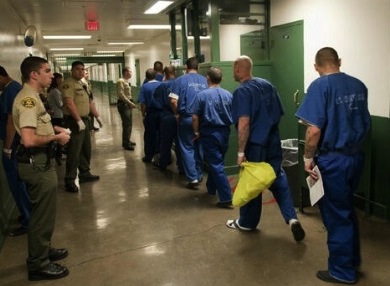Wave Wire Services
LOS ANGELES — Los Angeles County and the American Civil Liberties Union have settled a lawsuit focusing on longstanding problems at the Twin Towers Correctional Facility in downtown Los Angeles.
ACLU attorneys alleged that mentally ill detainees were shackled to chairs for days at a time at the Inmate Reception Center and others were crammed together, sleeping head-to-foot on concrete floors. The suit also detailed delays in processing and moving incarcerated people to permanent housing, and the provision of adequate medical and mental health care to people in the Inmate Reception Center awaiting permanent housing.
Under the agreement, which requires the judge’s approval to become final, the county agreed to a series of limits on how long those in custody may be held in various areas of the jail to ensure more humane treatment.
During a four-hour hearing on the case in April, U.S. District Judge Dean Pregerson said he would consider issuing sanctions and fines this month against the county unless it addressed conditions at the center.
The settlement recognizes the county’s efforts to deal with “the root causes of overcrowding, delays, and deteriorating conditions in the [Inmate Reception Center], and to ensure compliance” with previous court orders, according to documents filed June 16 in Los Angeles federal court.
As part of the county’s efforts, Sheriff Robert Luna has created a new supervisory position in the Inmate Reception Center filled by a sergeant on each of the three daily shifts to monitor compliance with the requirements set forth in the settlement, court papers show.
In addition, the county has expanded the number of cleaning crews and sanitation checks in the Inmate Reception Center; increased the number of correctional health services staff designated to provide mental health services in the Inmate Reception Center, including embedding additional psychiatric staff stationed in the center; hired 182 correctional health services employees for positions throughout the jails as of June 15; and assigned 215 recently graduated deputies to fill existing vacancies in custody operations.
The county also has moved to retrain staff on legal requirements for conditions and wait times in the Inmate Reception Center, decrease the jail population while balancing public safety concerns, and expand the capacity for community-based care for those who can be safely released or diverted from custody.
As a result, the total jail population has dropped from 14,209 to 13,176 — about 7% — from Feb. 27 to June 9, the county said.
Compounding the problems of an aged and decrepit jail, the mentally ill inmate population has skyrocketed in recent years, with half of those incarcerated similarly afflicted, Corene Kendrick, deputy director of the ACLU National Prison Project, told the court in April.
“After almost five decades of an endless cycle of promises followed by excuses and failures and generations of class members enduring abysmal conditions, the time for talk is over,” lawyers wrote in the filing seeking a contempt hearing.
Last September, the court granted a permanent injunction designed to help move mentally ill inmates and others out of the Inmate Reception Center and into secure housing within 24 hours.
The center, Pregerson said, is “one of the most complicated places on the planet.”









